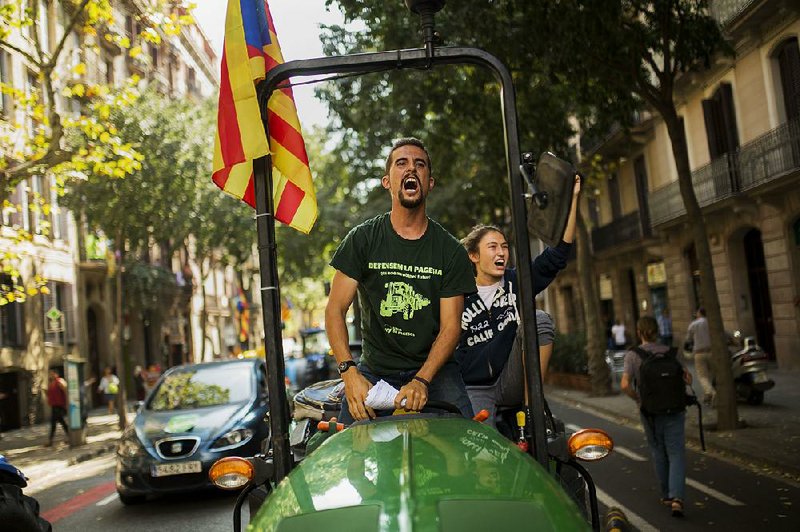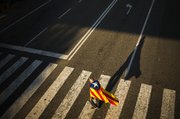BARCELONA, Spain -- Scores of Catalan farmers on tractors rumbled into downtown Barcelona on Friday, driving down the city's broad boulevards in a show of support for a vote on whether the prosperous region should break away from the rest of Spain and become Europe's newest country.
The Spanish government and secession-minded authorities in the northeastern Catalonia region were on a collision course, with the independence referendum still scheduled for Sunday despite efforts by the courts and police to stop it.
The tractors carried the Catalan pro-independence flag, called the "estelada," to the office of the national government's representative in Barcelona. Similar tractor protests were being held across Catalonia. The region's biggest farmers' union said the demonstrations were part of their fight for "democracy and liberty."
With weeks of antagonism and tension coming to a head, neither side was showing signs of backing down from a confrontation that has pitched Spain into a political and constitutional crisis.
The Madrid-based Spanish government has maintained that the ballot cannot and will not happen because it contravenes the constitution, which refers to "the indissoluble unity of the Spanish nation." Any vote on Catalan secession would have to be held across all of Spain, the government says.
"This secessionist process has been illegal from the start," government spokesman Inigo Mendez de Vigo said Friday. "Since the referendum ... won't have any political consequence, pursuing it won't do anything but extend the damage, the harm and the disintegration that it is already doing."
Acting on court orders, police have confiscated about 10 million ballot papers and some 1.3 million posters advertising the referendum, and have blocked the distribution of ballot boxes. On Friday, the Catalan police were ordered to clear out all 2,315 polling stations, most of them in schools, by 6 a.m. Sunday to prevent the referendum from taking place.
In an internal memo, the regional police chief, Maj. Josep Lluis Trapero, said patrols would be sent to confiscate ballot boxes and electoral papers.
Separatist groups had already been calling on parents to organize activities with students at the schools to prevent police from closing them before the vote.
David Martinez, a 46-year-old father of three, said he was taking his children to a weekend activity at their school in Barcelona's Eixample district.
"Given the recent events, the school community has decided to stand up and defend the democratic values that our kids need to learn," he said. "Values that are important, like freedom, dialogue, participation."
The Catalan regional government and local civic groups insist they are entitled to exercise their democratic rights and intend to do so regardless of the obstacles. Their grievances include what they say is Madrid's ignoring of the region's longstanding demands for a greater degree of autonomy and fiscal powers. With Barcelona as its regional capital, Catalonia contributes a fifth of Spain's $1.32 trillion economy.
On Friday, the Catalan government unveiled white plastic containers it said would be used as ballot boxes. More than 2,300 polling stations would be set up for 5.3 million voters, Catalan government spokesman Jordi Turull said.
"Everyone can stay calm, because we'll be able to vote," Turull said.
The government in Madrid ridiculed the preparations, saying there had been no formal campaign period and no electoral roll.
Barcelona has witnessed street demonstrations in favor of the ballot for weeks. Jordi Marti, a 63-year-old Barcelona taxi driver, has plastered his vehicle with stickers supporting the vote, saying the central government has kept Catalonia in a chokehold for too long.
"And now we have said, 'Game over,'" he said. "It's over because we have been negotiating with the Spanish government for 40 years ... and it hasn't been worthwhile."
Catalan leaders, including regional President Carles Puigdemont, said Thursday that senior European Union officials should step in and broker a political solution to the stalemate.
But European Commission Vice President Frans Timmermans appeared to put an end to that idea, saying Friday that the constitution must be respected.
"That is the rule of law -- you abide by the law and the constitution even if you don't like it," he said.
The demonstrations in support of independence have largely drowned out the voices of the opposition, with hardly any counterdemonstrations in favor of remaining part of Spain. While opinion polls have indicated the vast majority of Catalans favor holding a referendum, they are almost evenly split over independence itself.
Many who identify as both Catalan and Spanish dub themselves the "silent majority" of Catalonia. Student Josep Lago, 24, says the group faces social isolation and stigma from a solid group of nationalists and, very occasionally, also verbal and physical violence from a minority of radicals.
Catalonia as it is now, a prosperous region of northeastern Spain, suits Lago well. Like most of those who agree with him, he doesn't plan to vote in Sunday's referendum.
What does move him to get out of the classroom and protest, though, is what he sees as the refusal of his right to dissent in a society where the separatists' voice is the loudest.
"Radical independentists who had the monopoly of thought in the university campus don't want to allow other ideas," said Lago, who has taken legal action against the harassment and threats that his group of non-nationalist students received when they started to speak up.
Information for this article was contributed by Lorne Cook of The Associated Press.
A Section on 09/30/2017


